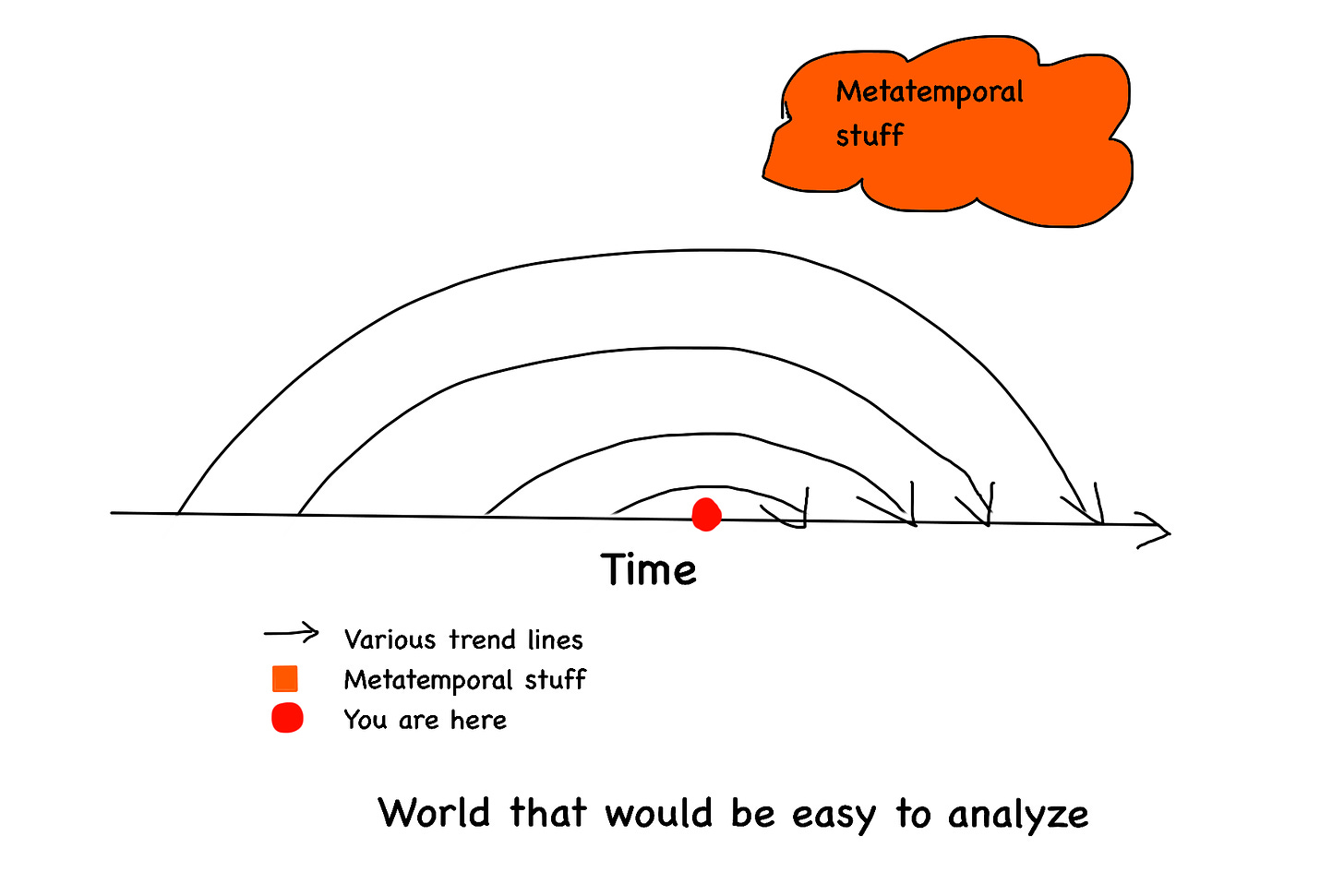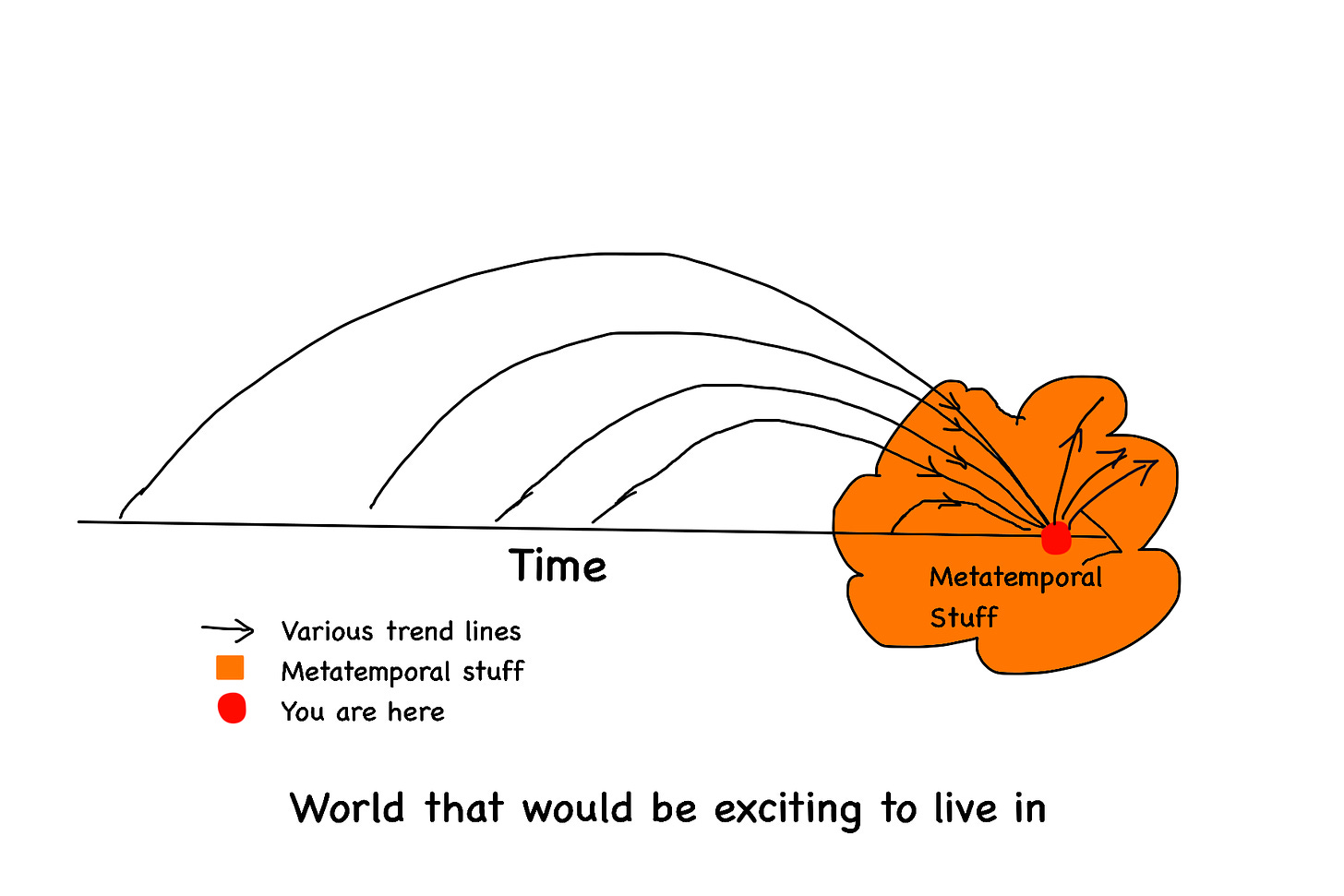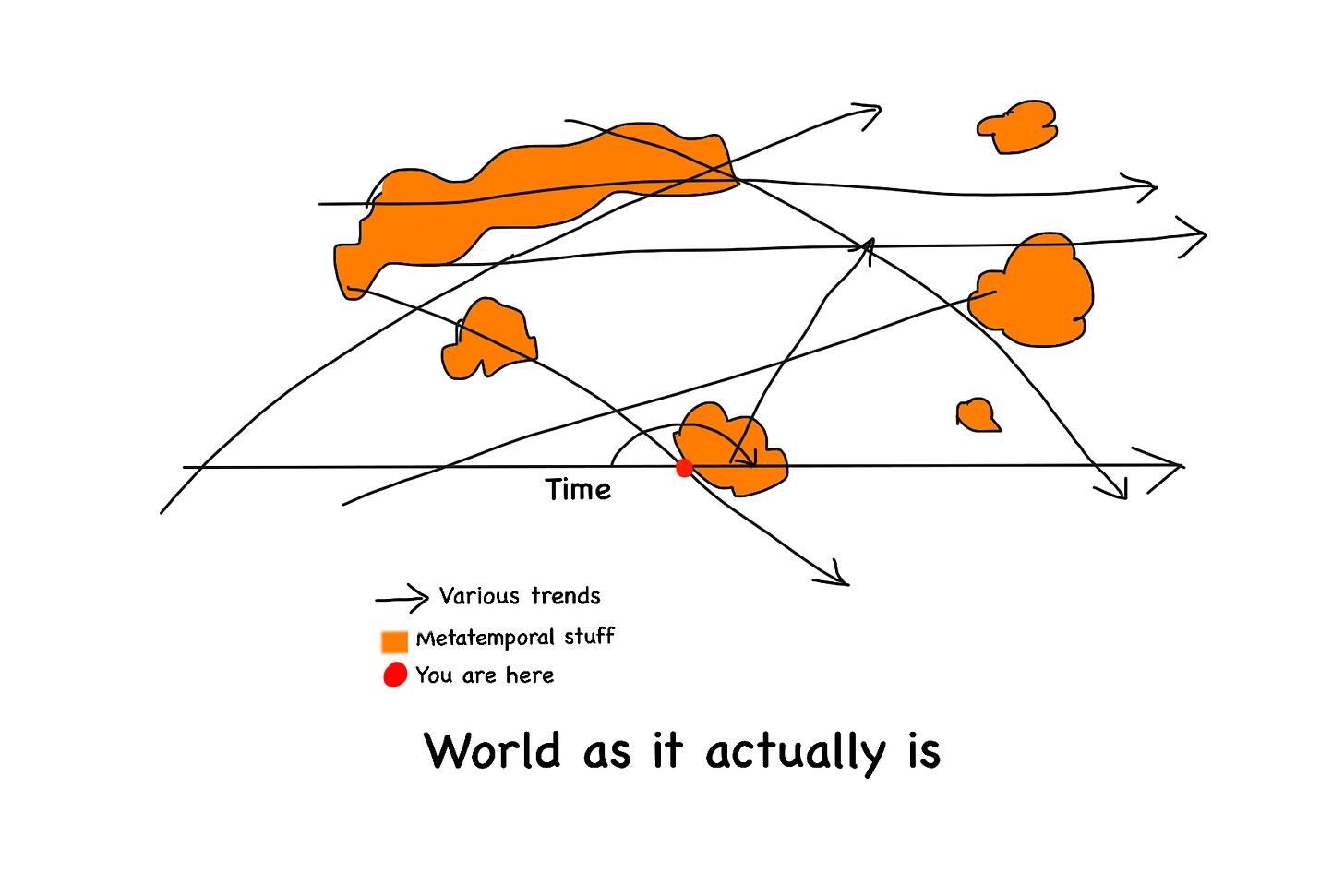Many Other Shoes Are Dropping
Length: • 9 mins
Annotated by Andrew Lovett-Barron
Many Other Shoes Are Dropping
The state of the world is hitting important closure moments
This week is the third anniversary of this newsletter in this form, and I want to take a moment to reflect on the state of this project, and through it, the state of the world it has been attempting to make sense of all these years.
The latter, to reduce it to to a single soundbyte, is in an other-shoe-drops phase in various historically important ways. That’s what I want to get to, but let me start with the reflections on this project.
I’ve been writing under the name Ribbonfarm Studio since July 16 2021. It was a significant pivot and rebranding of an earlier newsletter called Breaking Smart, which was a more narrowly tech-culture focused software-eating-the-world newsletter (2015-20) that had kinda run its course as a main scaffolding for things I wanted to think/write about by late 2019.
In its current form, the newsletter is thematically broader, politically more ambiguous and illegible (at least to me — you might have me in a clear box), and methodologically less polished. It is a studio in the sense that it is where I begin to form and shape my first reactions to things going on in the world. It is also where I grow several long-running ab initio creative projects in various states of incompletion, stalling, or derailment.
Therein lies a tension. As a writer, you cannot both react to the world and participate in writing it into existence — the bit role in “inventing the future” writers get to play — at the same time. My own approach to resolving this tension has been to use narratives at multiple time scales as scaffolding for sense-making. Events that conform (but not necessarily confirm) to one or more of my narratives leave me with room to develop my ab initio creative projects. Events that either do not conform to my narratives or simply fall outside of them entirely tend to derail or drain my creative momentum. It is the writer’s equivalent of what in computer architecture is called speculative execution. If you’re right enough, often enough, as a writer, you can have your cake and eat it too — react to the world, and say what you want to say at the same time.
Being derailed is not a bad thing though. Never being derailed is as bad as always getting derailed.
I think I have five main narrative scaffoldings going here in various stages of derailment:
- —8 to +4 years: The Great Weirding series
- -50 to +25 years: Mediocre Computing series
- -200 to +200 years: The Clockless Clock book project
- -400 to +400 years: After Westphalia longue duree history project
- Metatemporal stuff: Protocol narratives series
My scaffolding is somewhat, but not entirely symmetric in time.
I am very behind on my classifying and indexing, so those linked landing pages are not up to date, but almost everything I write fits into one or more of these narrative scaffoldings, at least in my headcanon. But they don’t always fit well. Some things neatly slot in as a next installment on a main sequence, by the established narrative logic. Other things clearly belong but in an unclear or supporting way, so I tend to tag them as “research notes.” Still others fit in a disruptive way, creating a bit of technical debt that should really drive a rewrite of older essays, but rarely do.
I try to avoid “crossing the streams” but it is often unavoidable, and sometimes it makes sense to index an essay in more than one series. One of these days, I’ll get the indexing up-to-date and try to make a map.
Unlike my much older WordPress blog Ribbonfarm, which I started in 2007 (and which has had its own evolving logic), this Studio newsletter is something like a streamlined, closed and bounded freshwater medium as opposed to an open saltwater medium. This newsletter is also much more hedgehog than fox, in the sense that I consciously try to weave the various strands together into a relatively consistent whole. Which is an unnatural thing for me, but I believe an appropriate sort of ambition for the times.
Neither blog, nor newsletter, lends itself to book production. I don’t think in book-sized/shaped units. I sometimes awkwardly shove my writing into book-sized/shaped chunks for easy packaging and sale, but books are not my medium. Nor am I an “essayist” in a classical sense. I think I’m something that could not have exited before the internet. I write connected skeins of essays that are somewhat, but not entirely, serializable, and do poorly when ripped from a hyperlinked context. It’s not great for archival, accessibility, or legibility at scale, but I think it is well-suited to making sense of the world in real time while also enjoying the luxury of a bit of poiesis through writing. It is living, breathing text of a sort only the internet allows you to generate.
But okay, back to the narrative scaffoldings of this newsletter. How exactly do they work?
One of the things about having this sort of cognitive approach — what engineers would call a frequency domain approach — is that the phases of your various narrative scaffoldings don’t always line up in any clean way.
If you adopt a simple rising action/falling action Freytag model of narratives, it would make for easy analysis if the world looked like this around your present:

This would be easy because you’re in the calm center of many synchronized narratives, and your metatemporal theorizing of how things work is up there in some abstract realm, shining meaning and significance on everything happening in time.
If you can’t have an easy to analyze world, you can at least hope for an exciting world, where many momentous narratives at various scales are coming to a close or just starting, putting the world in a liminal passage at all scales.

This wouldn’t be easy to analyze, since event-arcs on many time scales would be active at the same time and hard to sort out, and your metatemporal theories wouldn’t be off to the side in some abstract realm, but would instead saturate real, live action, and everything would be incredibly suffused with meaning and significance. You’d have the feeling of living in epic times. In the middle of a consciousness-raising for the world at large. Times when even ordinary actions by ordinary people can have epic historic consequences.
Unfortunately for our yearning narrative selves, the world is rarely in either purely easy or purely exciting mode. Both frames are egocentric conceits. It would be a wild coincidence indeed if you just happened to be in the most analytically tractable temporal position in history, at the “center of time,” from when everything is clear rather than muddy. It would be an equally wild coincidence if all the momentously significant historical arcs were converging or diverging from your life. If that were the case, you’d be right to suspect that you are some sort of Chosen One.
Which means the world, for most of us, alive at most times, looks something like this.

Some narratives are starting or ending around where you are. Others are shaping things but aren’t going to make your life either easy or exciting. Just annoying. Metatemporal theorizing existing as a fragmented overlay, lending significance to some events, and leaving other events meaningless, with a good deal of useless empty conceptualizing.
History is a messy thing. Theorizing it is difficult. If you’re lucky, sometimes things get easy or exciting for brief periods.
Now that said, I do think we live in somewhat exciting times by objective historical standards. 2024 feels more exciting than 1984, 1994, 2004, or 2014 for example. While the various narrative arcs don’t exactly converge in a perfectly exciting perfect storm of historic profundity, they do seem to be in an unusually exciting alignment by my 49 years of life.
So what exactly is exciting about 2024?
One way to think about it is that the other shoe is about to drop for many narratives.
- With the Trump/Biden election, the other shoe is about to drop on the arc that began with the Great Weirding. This arc has fuzzy beginnings and endings globally, but is clearly heading towards closure everywhere. For instance, the recent election in India, with its chastening message for the BJP, has a 10-year span (2014-24). In the EU and UK, various arcs that began with events in Greece/Italy and Brexit are headed towards some sort of natural closure.
- Crypto and AI, two strands in my mediocre computing series, also seem to be at an other-shoe-drops phase. Crypto, after experiencing 4-5 boom-bust cycles since 2009, is finally facing a triple test of geopolitical significance, economic significance, and “product” potential. It feels like in the next year or two we’ll learn if it’s a technology that’s going to make history or remain a sideshow. AI is shifting gears from a rapid and accelerating installation phase of increasing foundational capabilities to a deployment phase of productization, marked by Apple’s entry into the fray and a sense of impending saturation in the foundational capabilities.
- Various wars (Gaza, Ukraine) and tensions (Taiwan) are starting to stress the Westphalian model of the nation state for real now. That’s the other shoe dropping on a 400-year-long story (also a 75 year long story about the rules-based international order, but that’s relatively less interesting).
- Economically, we’re clearly decisively past the ZIRPy end of the neoliberal globalization era that began in the mid-80s. That shoe has already dropped. What new arc is starting is unclear — the first shoe of the new story hasn’t dropped yet. Something about nonzero interest rates in an uncertain world marked by a mercantilist resource-grabbing geopolitical race unfolding in parallel to slowly reconfiguring global trade patterns.
These other-shoe-droppings account for only about 30-40% of the narrative energy. Still that’s a lot. 30-40% narrative energy in “exciting” mode is quite exciting. In multi-scale terms, I think we’re in the most exciting period historical period I’ve experienced. Though 2016 and 2020 were perhaps more acutely exciting, that was more due to the energy of single strands (American politics, Covid). 2024 feels like a surge of global multi-level narrative energy coming to a head. Many other-shoes are starting to drop, or have recently dropped, within narratives ranging from 3 to 30 years in span.
Or if you like to think in agentic terms: This is about as clean a clean-sheet you’re ever going to get to reboot history in new ways. If you yearn for a break from the past, history is very breakable at the moment. It’s not quite a liminal-epic evolutionary bottleneck, but it’s close. The fan of possible futures right now is as wide as it’s ever been in my lifetime.
As above, so below. I’ll turn 50 later this year, and that feels like the end of the “growth arc” of my life. As a kid, people had various theories about my potential. At 50, I’m sort of a finished product, regardless of what the growth mindset crowd says. But at the same time, there’s a sense of a clean sheet for post-50.
Looking back at this newsletter project through this historical lens, at the staccato progress of various threads of writing, and the incidence of non sequitur derailments through the archives, it feels like my writing doesn’t just attempt to make sense of the world, but at the level of order/chaos, reflects the state of the world (convolved with my own state of course).
I’m frankly not sure what to make of the state of this newsletter, any more than I know what to make of the state of the world.
Is writing to sense-make a useful thing to be doing? (for me, not you; utility to you is a side effect). If not useful, is it at least interesting or exciting? If neither, is there some other mode of writing that’s a richer way of being in the world today? If not, is there something other than writing I could/should be doing?
My answer to all these questions is I don’t know. But I do know that continuing to write my way through the times feels like the right thing to do, as opposed to not writing.
It’s not as satisfying as it once was though — and I sense this is the case for all writers. Writing seemed like a more culturally significant, personally satisfying, aesthetically appropriate, and existentially penetrating thing to be doing in 2014 than it does now in 2024. I think we live in times when writing has less of a role to play in inventing the future, for a variety of reasons. You have to work harder at it, for less reward, in a smaller role. Fortunately for my sanity, writing is not the only thing I do with my life.
But maybe this is an illusion. Maybe writing feeling hard now is a bit like “buy low, sell high” being a hard thing to practice in investing. Maybe you don’t get to enjoy the periods when writing flows easily, and feels meaningful and satisfying, if you don’t also persist through the periods when it doesn’t. Maybe we’re just at the end of a long arc of 25 years or so, when writing online was exceptionally culturally significant and happened to line up with my most productive writing years, and the other shoe has dropped on the story of “blogging.”
Or maybe, with the rise of AI, the other shoe is about to drop on a much longer story than the story of blogging — the 6000 year old story of writing itself.